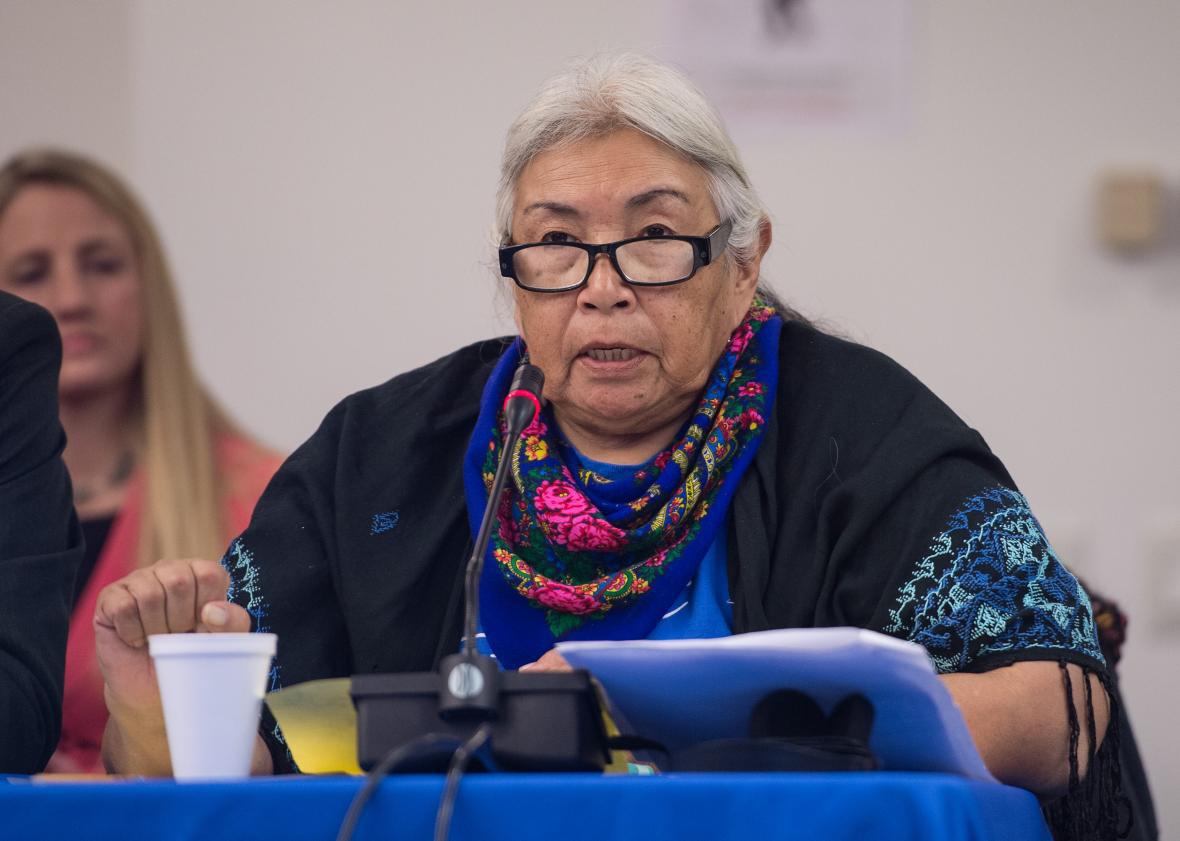Thanks to a “faithless elector,” an activist named Faith Spotted Eagle became the first Native American to receive an electoral vote for president this week. The 68-year-old member of the Yankton Sioux tribe wasn’t running for president, and she didn’t even know she had earned the vote until she got a call from a reporter. “I thought it was fake news,” she told the Los Angeles Times. It’s a happy—if strange—milestone with surprising historical echoes.
Democratic Washington state elector Robert Satiacum cast the renegade vote for Spotted Eagle. He had refused to back Hillary Clinton, because he believes she’s a “criminal” who hasn’t done enough to support Native American interests. Satiacum was a Bernie Sanders supporter during the election, but he felt drawn to write in Spotted Eagle’s name in the final moments before casting his ballot. Spotted Eagle is something of a celebrity in certain progressive communities because of her leadership in protesting the Keystone XL and Dakota Access oil pipelines.
Satiacum, a member of Washington’s Puyallup tribe, faces a $1,000 fine for failing to cast his vote for the winner of the state’s popular vote. But in an interview with Los Angeles Times reporter Matt Pearce, he sounded blithely defiant about his decision to break ranks. “It doesn’t matter who ascends to the throne. It’s the Olympics—a football game. It’s a distraction for the elite,” he said. “How did we get Bozo the Clown and Mickey Mouse to choose from for president?”
Spotted Eagle was not the first woman to receive an electoral vote, but neither was Hillary Clinton. That honor goes to Theodora “Tonie” Nathan, the vice-presidential candidate on the Libertarian ticket in 1972. (In between, Sarah Palin and Geraldine Ferraro also received plenty of electoral votes as vice-presidential candidates on major party tickets.)
Nathan secured her place in history from a faithless elector under circumstances that were almost as chaotic as this year’s. The Libertarian ticket, with philosopher John Hospers at the top, was only on the ballot in two states. Richard Nixon won the election in a landslide. But a Virginia Republican named Roger MacBride refused to cast his ballot for Nixon. Like Satiacum, MacBride notified the media that he was going rogue. In front of reporters, he dramatically crossed out the president and vice president’s names and wrote in Hospers and Nathan. The man reading the results mistakenly called Nathan “Theodore.” (Fun fact: MacBride co-created the subtly Libertarian TV series Little House on the Prairie.)
A Christmas Day 1972 op-ed in the New York Times expressed disgust with MacBride’s disobedience, framing it as a symptom of the entire system’s rot:
Like crumpled Christmas wrapping, once so important and so promising, the nation’s Electoral College system for selecting Presidents and Vice Presidents now stands ready for discard. … A defector-elector can disfranchise voters. All the antidemocratic features of the Electoral College threaten representative government and argue for adoption of an amendment to the Constitution providing for the simple, direct election of Presidents and Vice Presidents.
Forty-four years later, the oddities and injustices of the Electoral College system are still attracting scorn. And once again, a “defector-elector” has given a woman an accidental place in the history books.
